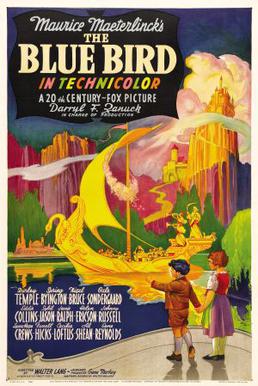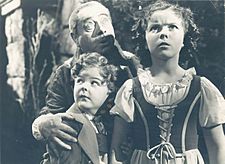The Blue Bird (1940 film) facts for kids
Quick facts for kids The Blue Bird |
|
|---|---|

Theatrical release poster
|
|
| Directed by | Walter Lang |
| Produced by | Darryl F. Zanuck |
| Written by | Screenplay: Ernest Pascal Walter Bullock Play:The Blue Bird (1908) Maurice Maeterlinck |
| Starring | Shirley Temple Spring Byington Nigel Bruce |
| Music by | Alfred Newman |
| Cinematography | Arthur C. Miller Ray Rennahan |
| Editing by | Robert Bischoff |
| Distributed by | Twentieth Century-Fox Film Corporation |
| Release date(s) | January 15, 1940 |
| Running time | 88 minutes |
| Country | United States |
| Language | English |

The Blue Bird is a 1940 B&W and Technicolor American fantasy film directed by Walter Lang. The screenplay by Walter Bullock was adapted from the 1908 play of the same name by Maurice Maeterlinck. Intended as 20th Century Fox's answer to MGM's The Wizard of Oz, which had been released the previous year, it was filmed in Technicolor and tells the story of a disagreeable young girl (played by Shirley Temple) and her search for happiness.
Despite being a box office flop and losing money, the film was later nominated for two Academy Awards. It is available on both VHS and DVD.
Plot
The setting is Germany during the Napoleonic Wars. Mytyl (Shirley Temple), the bratty and ungrateful daughter of a woodcutter (Russell Hicks), finds a unique bird in the Royal Forest and selfishly refuses to give it to her sick friend, Angela (Sybil Jason). Mother (Spring Byington) and Father are mortified at Mytyl's behavior. That evening, Father is called on to report for military duty the next morning. That same night, Mytyl is visited in a dream by a fairy named Berylune (Jessie Ralph) who sends her and her brother Tyltyl (Johnny Russell) to search for the Blue Bird of Happiness. To accompany them, the fairy magically transforms their dog Tylo (Eddie Collins), cat Tylette (Gale Sondergaard), and lantern ("Light") into human form. The children have a number of adventures: they visit the past (meeting their dead grandparents who come to life because they are being remembered), escape a scary fire in the forest (caused by Tylette's lies to the trees in a treacherous attempt to make the children quit their journey), experience the life of luxury, and see the future, a land of yet-to-be born children. The dream journey makes Mytyl awake as a kinder and gentler girl who has learned to appreciate all the comforts and joys of her home and family. The following morning, Father receives word that a truce has been called and he does not have to go to war, and Mytyl is inspired to give the unique bird (now discovered to be the eponymous Blue Bird she had sought throughout her journey) to Angela.
Cast
- Shirley Temple as Mytyl
- Spring Byington as Mummy Tyl
- Nigel Bruce as Mr. Luxury
- Gale Sondergaard as Tylette
- Eddie Collins as Tylo
- Sybil Jason as Angela Berlingot
- Jessie Ralph as Fairy Berylune
- Helen Ericson as Light
- Johnny Russell as Tyltyl
- Laura Hope Crews as Mrs. Luxury
- Russell Hicks as Daddy Tyl
- Cecilia Loftus as Granny Tyl
- Al Shean as Grandpa Tyl
- Leona Roberts as Mrs. Berlingot
- Gene Reynolds as Studious Boy
- Stanley Andrews as Wilhelm
- Frank Dawson as Caller of Roll
- Sterling Holloway as Wild Plum
- Thurston Hall as Father Time
- Edwin Maxwell as Oak
- Herbert Evans and Brandon Hurst as Footmen
- Keith Hitchcock as Major Domo
- Tommy Baker and Dorothy Joyce as Lovers
- Billy Cook as Boy Chemist
- Scotty Beckett, Juanita Quigley and Payne Johnson as Children
- Ann Todd as Little Sister
- Diane Fisher as Little Girl
- Roberta Skoll as little girl who tried to board the ship too early
Four-year-old Caryll Ann Ekelund (credited as Caryll N. Ekelund), appears as an unborn child in the film. On Halloween 1939, Ekelund's costume caught fire from a lit jack-o-lantern. She died from her burns several days later and was buried in her costume from the film. Ekelund came from a show business family, and her older sister was actress Jana Lund.
The 'Studious Boy' played by Gene Reynolds is a yet-to-be-born Abraham Lincoln, indicated by Alfred Newman's theme from 'Young Mr Lincoln' (1939).
Differences between film and stage version
The film, although following the basic plot of the stage version, highly embellishes it, and does not literally use the original dialogue. The opening black-and-white scenes and the war subplot were invented for the film. Mytyl's selfishness, the basic trait of her personality, was a plot thread specifically written into the motion picture. It is not in the original play.
The play begins with the children already asleep and the dream about to begin; there is no depiction of the family's daily life, as there is in the 1940 film.
Music
Alfred Newman's original score to The Blue Bird was released in 2003 by Screen Archives Entertainment, Chelsea Rialto Studios, Film Score Monthly and Fox Music. The album contains the entire score as heard in the film in chronological order. It was produced using rare preservation copies of the original nitrate optical scoring sessions which were digitally restored by Ray Faiola. This rare limited edition includes a lavishly illustrated 24 page color booklet featuring extensive liner notes by film and music historians Jon Burlingame and Ray Faiola detailing the film's production and scoring.
Track listing
- Main Title - 1:17
- The Royal Forest - 3:19
- Selfish Mytyl/Come O Children One and All/Returning Home with the Bird - 7:32
- Awaking in Technicolor/Tylo and Tylette on Two Legs/Search for the Blue Bird - 10:04
- In the Graveyard - 3:44
- There Are No Dead People/Granny and Grandpa - 4:57
- Lay-De-O (sung by Shirley Temple) - 1:00
- Leaving Granny and Grandpa - 1:29
- The Land of Luxury - 4:44
- Carousel in the Foyer - 0:40
- Fighting Over the Horse - 1:13
- Fed Up with the Land of Luxury - 5:35
- Escape - 1:51
- Return to "Light" - 1:43
- Tylette Summons the Trees/Forest Fire - 8:09
- Boat to Safety/The Land of Unborn Children - 5:30
- Father Time/The Children are Born - 8:01
- Returning Home - 1:57
- Waking Up/Finale - 5:15
- End Cast - 0:58
Total Time: 79:12
'The Land of Unborn Children' includes a few bars from Newman's theme for 'Young Mr Lincoln' (1939) as the 'Studious Boy' played by Gene Reynolds is a yet-to-be Abraham Lincoln.
Awards
The film was nominated in two categories at the 13th Academy Awards ceremony:
- Academy Award for Best Cinematography - (Arthur Miller, Ray Rennahan)
- Academy Award for Best Visual Effects - (Fred Sersen (photographic), Edmund H. Hansen (sound))

